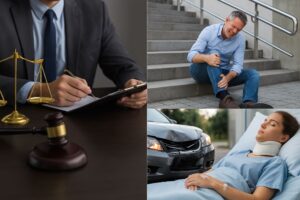5 Key Questions to Ask Personal Injury Attorneys in Miami
Selecting the right personal injury lawyers in Miami is vital when you have been injured due to someone else’s negligence. With a variety of options, other than experience, how do you make sure to select the best one? At Kirshner, Groff & Diaz (KG&D) legal offices, we hold that mindful clients make the best decisions about personal matters. The trick of asking the right questions lies in finding a lawyer who fights for you.
How do you hire a good person for your case? Would you ask questions? Below are five key questions to ask before engaging the services of your personal injury lawyer within Miami.
- What experienced in personal injury cases in Miami?
Why this is important
Not every in the attorney knows about personal injury law. When you have been involved in such areas as car accidents, slip, and fall accidents, or medical malpractice, it requires that typical kind of knowledge and expertise.
What makes KG&D unique?
In KG&D, our personal injury attorneys in Miami have been doing so much work in various areas of the law for a long time up till now.
- Car and motorcycle accidents
- Premises liability claims
- Medical malpractice cases
- Wrongful death lawsuits
We have retrieved millions for our clients and stand ready to fight for your rightful reimbursement!
- Back-up suggestion: Inquire about recent case results and ascertain the attorney’s trial experience.
- How do personal injury cases work?
Attorneys typically will conduct a very speedy settlement to steer clear of long litigation, and they are eager to take your case before the Court to win the most money for you.
KG&D’s Client-First Strategy
We tailor our approach to your specific case. Our process includes:
- Comprehensive case investigation
- Collecting strong evidence and expert testimony
- Aggressive negotiation with insurance companies
- Litigation when necessary to secure fair compensation
- Pro Tip: Choose personal injury attorneys in Miami who prioritize negotiation and litigation skills.
- What will it cost me to get a personal injury attorney in Miami?
Grasping Legal Costs: Nearly all of the personal injury attorneys within Miami operate based on a contingency fee plan, that being you only pay them if and when you win your case. You might want to confirm this.
Transparent Fees at KG&D
At KG&D, we offer:
- Free consultations to review your case
- No upfront costs—you pay only if we secure compensation
- Clear explanations of any potential case-related expenses
Important Questions to Ask:
- How is the contingency fee structured?
- Are there additional costs if the case goes to trial?
- Will I be responsible for expenses if we lose?
- How are you planning to communicate throughout my personal injury case?
Why Communication is Essential: Making a situation where you have experienced personal injury easier to go through. It has some of the mandatory elements as frequent updates and in-time response.
KG&D’s Commitment to Clear Communication
With KG&D, you get:
- Direct communication with your attorney
- Regular case updates via your preferred method (phone, email, in-person)
- Clear explanations of complex legal terms
- Red Flag: Avoid attorneys who are hard to reach or vague about updates.
- What Timeline and Outcome Can I Expect?
Managing Expectations: No lawyer can guarantee the result of a case, but an experienced one should provide an estimated time frame and potential outcomes to help you prepare for all scenarios.
Honest Evaluations at KG&D
Factors that may affect your case duration include:
- Insurance negotiations
- Medical treatment timelines
- Potential court proceedings
‘At KG&D, our assessments are upfront, and we work fast to achieve your compensation.
- Tip: Any attorney giving you promises about a quick solution without discussing the details about your case is one attorney you should be cautious about.
Why Hiring the Right Personal Injury Attorneys in Miami Matters
Selecting the right legal team can hugely affect what happens in a certain case. When you ask yourself these five questions, you begin to have someone who puts your interests first.
- Decades of experience with personal injury law in Miami
- Transparent fee structures with no hidden costs
- Proven record of successful settlements and verdicts
- Client-focused communication and support
Why Hiring the Right Personal Injury Lawyer Teams in Miami Counts?
A top-notch legal team will make all the difference on the outcome of your case. By asking these five critical questions, you will fully assess to what extent the attorneys are concerned about you, and your well-being.
What Sets KG&D Apart?
🔹 Over 30 years of personal injury experience in Miami
🔹 No fees unless we win your case
🔹 Personalized legal strategies tailored to you
🔹 Compassionate representation with proven results
Feeling Looking-up for Personal Injury Attorney Consultation in Miami?
Never try to file injury cases by yourself: Contact KG&D personal injury attorneys now for a free consultation on how to try to help you receive compensation.
Now call us up!

